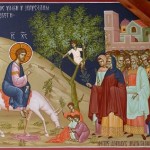 The Bible AND The Church: not The Bible OR The Church – Titus 1
The Bible AND The Church: not The Bible OR The Church – Titus 1
In a few short verses in Titus, St. Paul establishes the foundation for a good church. Though his commandments to Titus are not comprehensive, they do give us a crucial and fascinating insight into both the first century Church and into what Paul considered most important. The two most essential points may be summarized by saying that Paul believed and taught that the apostolic teaching and the apostolic ministry were utterly dependent on each other and that together they constituted the essence of the apostolic church.
It has often been said (because it is often true) that Catholics (by which I mean more than just Roman Catholics) tend to emphasize the church (apostolic ministry), while Protestants emphasize the gospel (or apostolic teaching.) What is interesting is that in three consecutive books of the Bible (1 Timothy, 2 Timothy, and Titus), the apostolic teaching of Paul is that the apostolic ministry, which means especially (but not only) the ordained clergy, is essential to teaching and guarding the apostolic teaching.
Contrary to some Protestants who think that the Bible or Word of God is sufficient in and of itself (in a distorted version of sola Scriptura), Paul clearly believed that the ordained clergy and the institution of the Church was essential to the preservation of the Word of God. More than this, if we look carefully and honestly at what Paul says in these 3 books, we have to admit that having ordained clergy who are able to pastor and teach is actually an essential part of the very apostolic teaching we so cherish. To believe, as some do, that the Church is any collection of Christians who happen to get together, and that they have the right to determine what the Bible means by themselves, is very far removed from what Paul actually teaches.
This is clear not only from the general teaching of Paul in these books but also in verse 5 of Titus 1. Paul commands that one of the first things Titus must do if he is to set the churches in order is to ordain elders in every city, as he had previously commanded. This is exactly what we find the early church doing in Acts 14:23 – appointing elders in every church. Because Titus clearly had oversight of more than one church, he is often seen as one of the first bishops, not merely in the sense of being an overseer or elder but also in the sense of being a pastor to pastors. Paul’s letters to Timothy and Titus are his last letters, at a time when the shape of the apostolic church had taken a more definite shape. We also know from other sources that by the end of the first century bishops as a separate office existed and soon became universal.
Why does Paul consider the apostolic ministry of the ordained clergy so highly? Because these men are the heirs of the apostles themselves. To them especially has been entrusted the things of God (verse 7 – they are stewards of God), and they are the ones who have special authority to teach the apostolic teaching.
There is also a special urgency to Paul’s letters to Timothy and Titus. He knows that he will soon die and no longer be able to carry out his apostolic ministry. What is most on his mind? Again, that the apostolic teaching be preserved by ordaining blameless elders. How can he be sure that his apostolic teaching will be faithfully transmitted to the next generation and to the new churches? By ordaining apostolic ministers who have the same authority that the apostles had to guard the faith, and to teach the truth.
Though Paul knows that God is faithful to His promises and cannot lie (verse 2), Paul recognizes that he is one of God’s elect ministers (verse 1) to whom the gospel has been entrusted. He must now entrust to faithful men (1 Timothy 2:1) what Jesus Christ entrusted to him.
It is precisely because of the high regard Paul has for God’s inspired Word that he also highly regards the office of elder and commands such high standards for such leaders. Once again, the apostolic teaching must be guarded by apostolic ministers.
What does all of this have to do with you? Simply this. If you want to be faithful in reading God’s Word and understanding its teaching, then you need to be submitted to those to whom the apostolic ministry has been entrusted. I’m not talking about turning off your mind and slavishly accepting everything anyone calling himself a pastor says.
God forbid!
Anyone who knows me or who has heard me preach knows that I am constantly saying that “all members are ministers.” Every baptized Christian has been anointed to be a minister in God’s kingdom, and therefore we all have a part in guarding the Word in our lives.
But I do mean that if we say we take the Word of God seriously, then we need to be humble before it, including the parts that teach that the Word of God has been especially entrusted to the ordained clergy. Even the teachers and pastors of the church must be submitted not only to what the Bible teaches but had better be submitted to the larger Church and what the Church has always taught.
I encourage you, then, to consider the way you read and understand the Bible. While it is entirely appropriate to take what Paul commands Timothy and apply it to our own lives, so that we cherish the Word of God and guard it with our lives, we need to make sure we are reading it, meditating on it, and living by it in the context of the one, holy, catholic, and apostolic Church.
This will require that some of you are willing to read what other Christian teachers have taught over the last 2000 years, and not just what has been written recently or from the point of view of one church or denomination.
It will require that we read the Bible together, as God’s people.
I feel privileged to be able to share the Word of God with each of you every day. How cool would it be if it were possible for a church to gather together to read the same Scripture every day and meet to discuss it and pray over it? I know that some of you as couples are already reading and praying together over God’s Word: what a godly example you are to us!
Prayer: Father, thank You for giving us the words of life and for providing for the teaching and guarding of Your Holy Word by those whom You have appointed as elders. Create in me a heart to seek You through Your Word each day, and give me a humble and teachable spirit that I might better hear and obey You.
Point for Meditation:
Reflect on your growth in understanding the Word of God. What people or tools have been especially helpful in nurturing your better understanding and application? In what ways may God be calling you to refresh your love and understanding of God’s Word. What means of better hearing and obeying His Word has He given you that have been left unused?
Resolution: I resolve to consider how I may minister at my local church to support the ministry of the Word.
Wyclif Bible – Photo by Fr. Charles Erlandson















